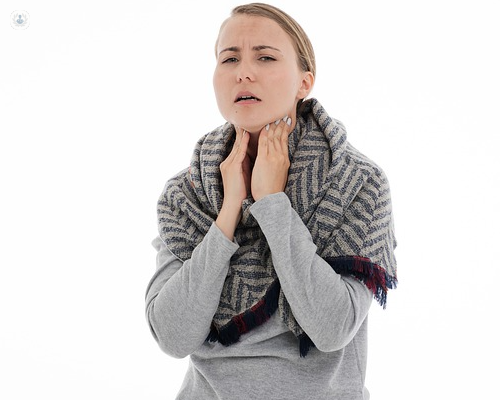FAQs about alcohol and the throat
Written by:Alcohol abuse can cause a wide range of problems with the throat, including persistent sore throat, hoarseness, throat clearing, laryngopharyngeal reflux (when stomach acid travels to the throat), and head and neck cancers. Consultant ENT surgeon Mr Julian McGlashan explores this link and gives some advice on how to reduce alcohol consumption.

Is there a link between head and neck cancer and drinking alcohol?
It is undeniable that drinking alcohol in excess can increase the likelihood of developing cancer of the mouth, throat, larynx and oesophagus. This likelihood increases further when combined with smoking as alcohol makes it easier for the carcinogenic chemicals in tobacco to damage the throat. For more information, you can visit Cancer Research UK.
How does alcohol cause throat problems?
Some of the throat related problems caused by alcohol include:
- Inflammation and swelling of the throat, which is caused by the alcohol irritating the throat lining.
- Laryngopharyngeal reflux- Acid and enzymes from the stomach rising to the throat, which happens due to alcohol causing the valve at the bottom of the gullet to relax.
- Direct damage to the lining of the throat, mouth and oesophagus.
- Formation of acetaldehyde, a chemical which can cause brain problems and damage throat tissues, potentially causing cancer to develop.
Are there other proven risks of drinking too much alcohol?
- Alcohol abuse can have a detrimental effect on your relationships, work performance and finances.
- It is believed that alcohol contributes to 15 per cent of road accidents, over a quarter of drowning incidents, over a third of fire-related deaths and over a quarter of accidents at work. Drinking excessively can also be more vulnerable to certain crimes.
- Drinking more than the recommended daily limit can increase the risk of heart problems, hypertension, stroke, liver disease and falling.
- Alcohol abuse or the health issues associated with it is the cause of over 30,000 deaths per year.
- Over 9,000 cancer deaths in the UK each year are linked to alcohol. Apart from head and neck cancers, there is a direct link between alcohol abuse and breast, bowel and liver cancers.
- Alcohol is second to only smoking in terms of drug-related UK deaths.
How much alcohol is it safe to drink?
The latest advice from UK health officials states that drinking alcohol in any quantity is damaging to your health. However, we can at least reduce the risks by sticking to the following guidelines:
- Try not to regularly drink over 14 units in a week.
- If you do exceed the recommended number of weekly units, try to spread your drinking out over at least three days.
- Try to make sure you have a minimum of two to three days without drinking each week.
Units of Alcohol
It’s important not to confuse units of alcohol with number of drinks. See the list below to find out how much of each drink constitutes 14 units:
- 6 pints (568mls) of 4% beer or lager
- 10 cans (330mls) of 4% beer or lager
- 8 small bottles (330mls) of 5% beer
- 5 pints (568mls) of 4.5% cider
- 6 glasses (175mls) of 13% wine
- 1.5 bottles (75mls) of 12.5% wine
- 14 single shots (25mls glasses) of 40% spirits
- 12 small bottles (275mls bottles) of 4% alcopops
You can calculate your weekly alcohol unit intake by visiting drinkaware.co.uk.
Am I drinking too much and am I addicted to alcohol?
If you think you may be addicted to alcohol, you may want to consider the following questions:
- Do you have trouble controlling your alcohol intake, particularly after you have your first drink?
- Do you find it difficult to reduce your intake or quit completely when you try for events like “Dry January” or Lent?
- Do you give in to temptation every time you try to quit?
If your answer to any of these questions was “yes”, you may have an alcohol addiction and should seek professional help.
What can I do if I need more help?
Speaking to your GP is the first step to overcoming your alcohol problems as they can refer you to a specialist. Alternatively, here is a list of websites you can visit for assistance
Mr Julian McGlashan is a leading otolaryngologist in Nottingham, visit his Top Doctors profile to request an appointment.


